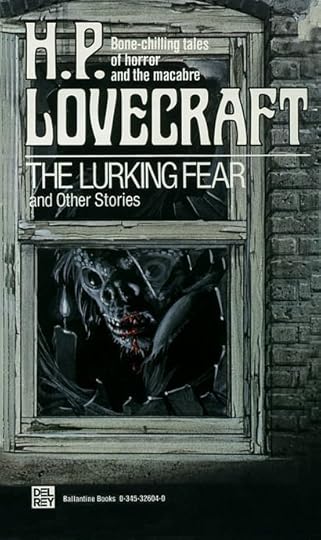 Chris’s
Comments
(group member since Mar 04, 2018)
Chris’s
Comments
(group member since Mar 04, 2018)
Chris’s
comments
from the Written Gems group.
Showing 1-20 of 102
 Gilbert wrote: "I think that the problem starts with no way to measure time and then ERB started to think of fantastic possibilities ..."
Gilbert wrote: "I think that the problem starts with no way to measure time and then ERB started to think of fantastic possibilities ..."One thing you have to remember about ERB is he was fascinated with longevity, immortality, etc. Tarzan and Jane became immortal, John Carter is ageless as are the Barsoomians to an extent. On Venus, they take a pill that remediates all illness, thereby extending their lives greatly. It is no surprise he invented a way to make his characters ageless and wrinkle-free in Pellucidar by nullifying time.
 In the original novels the inability to perceive the passage of time is due to there being no way to measure the passage of time . . . there are no moving planetary bodies, no night/day sequence that repeats itself like ::ahem:: clockwork. With the lack of being able to measure the passage of time humans become unaware of its passage and the world becomes timeless. This is where ERB springs his idea that it is the awareness of time's passage that causes time to exist, and therefore aging etc. Naturally, you get more of this if you read the entire series, but I thought he did a passable job of incorporating the idea in At the Earth's Core.
In the original novels the inability to perceive the passage of time is due to there being no way to measure the passage of time . . . there are no moving planetary bodies, no night/day sequence that repeats itself like ::ahem:: clockwork. With the lack of being able to measure the passage of time humans become unaware of its passage and the world becomes timeless. This is where ERB springs his idea that it is the awareness of time's passage that causes time to exist, and therefore aging etc. Naturally, you get more of this if you read the entire series, but I thought he did a passable job of incorporating the idea in At the Earth's Core.Now, in the newer ERB Universe novels there is an ongoing effort to explain some of the seeming anomalies and scientific inaccuracies in ERB's works. One of those explanations is that these other worlds, Va-nah the Earth's hollow Moon, Pellucidar that lies within our hollow Earth, Barsoom: ERB's version of Mars, Amtor: ERB's vision of Venus are actually parallel worlds lying in different dimensions (or what the Universe authors call "angles") that lie in conjunction with these very-real worlds as we know them but are actually quite different.
There are portals to these other worlds that our adventurers have unwittingly passed through (i.e. John Carter traversing, with a snap as of a steel wire breaking, the cold ether of space to land on a version of Mars that is totally different than our real Mars.) So too is the "North Polar opening" of Pellucidar, with Pellucidear lying on the inside of a parallel Earth that has different physics from our real Earth, where time . . . well, you see where I am going with that.
The time discrepancy of Korak I feel is partially at the root of this new explanation as ERB left a very real problem in that he set the time of Tarzan's son, Jack, at just prior to the breakout of WW1 in which he supposedy fought. Check out this quote by Philip Jose Farmer:
"How could Tarzan's son be born in 1912, run away in 1913, battle mangani, lions, black warriors, Arabs, and such, and, in 1918, fight on the Argonne front?"
We know that an infant child would not have fought his way across the length and breadth of a WW1 battlefield, hence the Korak time paradox which has had people wringing their hands for decades.
The effort of the Universe authors to pull everything together into a cohesive timeline and universe is working really well, with everything kind of dropping into place. But to try to figure it out based on ERB's original writings leaves us with holes and inexplicable issues. The man was cranking out stories and could in no way foresee what he might wish to do at a later date after he had painted himself into a corner. But like a buddy of mine once said, if ERB were writing a story set in the desert and needed an acacia tree, he'd plop it down and go on.
This might be more than what you guys wanted on the time thingy, but there ya have it. Search for The Great Korak Time Discrepancy to read more on this. Goodreads won't let me put in a link, but add Captain Comics to your search, there is a great article there.
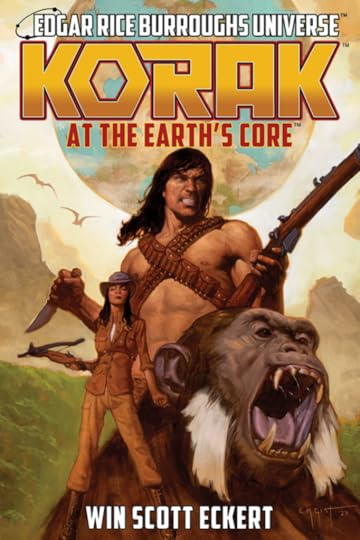
 William wrote: "Fabulous Chris! I never thought you'd use the speed of your reading to measure the speed of the prospector. Good thing I didn't do the work, or they'd surely have died of asphyxiation.
William wrote: "Fabulous Chris! I never thought you'd use the speed of your reading to measure the speed of the prospector. Good thing I didn't do the work, or they'd surely have died of asphyxiation.At any rate,..."
Well, It's a rough estimate. Reading speeds vary, speaking speeds vary, but I think we can estimate they made between 35mph and 45mph or a bit faster, perhaps? They didn't have unlimited oxygen, as evidenced by the fact they almost asphyxiated, so it has to be pretty swift to travel the 500 miles before they run out of air.
 William wrote: "That all makes sense, Chris, thanks. I'm still scratching my head about the motive power (steam, or maybe gas-powered). I also figure the speed was pretty darn good, I'm thinking it was around 20 m..."
William wrote: "That all makes sense, Chris, thanks. I'm still scratching my head about the motive power (steam, or maybe gas-powered). I also figure the speed was pretty darn good, I'm thinking it was around 20 m..."As to the speed, I cannot find in the text where it is given, but we are given an approximate in this piece of text. Read this passage:
"I should think, Perry,” I chided, “that a man of your professed religiousness would rather be at his prayers than cursing in the presence of imminent death.”
“Death!” he cried. “Death is it that appalls you? That is nothing by comparison with the loss the world must suffer. Why, David within this iron cylinder we have demonstrated possibilities that science has scarce dreamed. We have harnessed a new principle, and with it animated a piece of steel with the power of ten thousand men. That two lives will be snuffed out is nothing to the world calamity that entombs in the bowels of the earth the discoveries that I have made and proved in the successful construction of the thing that is now carrying us farther and farther toward the eternal central fires.”
I am frank to admit that for myself I was much more concerned with our own immediate future than with any problematic loss which the world might be about to suffer. The world was at least ignorant of its bereavement, while to me it was a real and terrible actuality.
“What can we do?” I asked, hiding my perturbation beneath the mask of a low and level voice.
“We may stop here, and die of asphyxiation when our atmosphere tanks are empty,” replied Perry, “or we may continue on with the slight hope that we may later sufficiently deflect the prospector from the vertical to carry us along the arc of a great circle which must eventually return us to the surface. If we succeed in so doing before we reach the higher internal temperature we may even yet survive. There would seem to me to be about one chance in several million that we shall succeed—otherwise we shall die more quickly but no more surely than as though we sat supinely waiting for the torture of a slow and horrible death.”
I glanced at the thermometer. It registered 110 degrees. While we were talking the mighty iron mole had bored its way over a mile into the rock of the earth’s crust."
It took me roughly 75 seconds to read the dialogue, and skim the prose. In 75 seconds, or 1.25 minutes, they bored 1 mile. The text claims they bored exactly 500 miles to Pellucidar. If that speed was consistent, it took them 625 minutes, or ~10.4 hours from the Earth's surface to the inner world.
That equates to roughly ~48 MPH, unless I've missed something.
**Edit** Adding the quote about the 500 miles to Pellucidar from the Earth's outer crust:
"With my last flickering ray of consciousness I turned mechanically toward the distance meter. It stood at exactly five hundred miles from the earth’s surface—and then of a sudden the huge thing that bore us came to a stop."
 William wrote: "That all makes sense, Chris, thanks. I'm still scratching my head about the motive power (steam, or maybe gas-powered). I also figure the speed was pretty darn good, I'm thinking it was around 20 m..."
William wrote: "That all makes sense, Chris, thanks. I'm still scratching my head about the motive power (steam, or maybe gas-powered). I also figure the speed was pretty darn good, I'm thinking it was around 20 m..."I did find this passage in the text, where Innes is about to return to the surface. I'm guessing tho, that the oil is for lubrication, but who knows, maybe a super efficient petroleum engine?
"With a large force of men we marched to the great iron mole, which Perry soon had hoisted into position with its nose pointed back toward the outer crust. He went over all the machinery carefully. He replenished the air tanks, and manufactured oil for the engine"
 William wrote: "That all makes sense, Chris, thanks. I'm still scratching my head about the motive power (steam, or maybe gas-powered). I also figure the speed was pretty darn good, I'm thinking it was around 20 m..."
William wrote: "That all makes sense, Chris, thanks. I'm still scratching my head about the motive power (steam, or maybe gas-powered). I also figure the speed was pretty darn good, I'm thinking it was around 20 m..."Apologies, you meant what fuel powered its engines, ie coal, diesel, etc. It does not say, as that was a secret upon which they planned to capitalize when they returned from the trial run:
"At one end is a mighty revolving drill operated by an engine which Perry said generated more power to the cubic inch than any other engine did to the cubic foot. I remember that he used to claim that that invention alone would make us fabulously wealthy—we were going to make the whole thing public after the successful issue of our first secret trial"
 William wrote: "But some of what it evoked was confusion. ERB wasn't too big on motive powers, and I don't recall too much about a drill in front (though I assume there was one).."
William wrote: "But some of what it evoked was confusion. ERB wasn't too big on motive powers, and I don't recall too much about a drill in front (though I assume there was one).."Yep, it definitely had a drill:
"He tested the steering device, and overlooked the mighty cogs which transmitted its marvelous velocity to the giant drill at the nose of his strange craft."
As to the "motive powers" you mentioned, I believe you refer to those "mighty cogs" which worked in conjunction with the "giant drill." You can see these cogs in the movie prop, at the tail and just behind the drill.
On the inner and outer shell thing, I can only conjecture that ERB was thinking of the prospector in a manner similar to a submarine, and possibly some material made its way between them. But I don't believe it was that material was coursing its way through when running at speed, just that perhaps some extraneous material found its way within. I dunno for sure. It does say David Innes had to use a shovel to dig out between the hulls to reach the outer door.
"There was quite a quantity of loose material in the jacket, and this I had to remove with a shovel to get at the opposite door in the outer shell."

 William wrote: "Spot-on about the romance angle, Chris, that's absolutely identical. This whole I-had-no-idea-you'd-be-offended thing is an incel's dream! I actually strain to believe the female characters a bit, ..."
William wrote: "Spot-on about the romance angle, Chris, that's absolutely identical. This whole I-had-no-idea-you'd-be-offended thing is an incel's dream! I actually strain to believe the female characters a bit, ..."Totally agree. Both girls are informed at the get-go that the guy of their dreams is from another world, and yet they still become offended by his lack of maintaining their expectations--when they are both cognizant of the fact that he knows nothing about them!
I still love and enjoy both female leads in these stories, tho, despite this seeming inability to just say, "Oh, well, he doesn't know!" regarding social niceties.
Yep, it sure is a fun plot driver. And ERB also used this same idea (he seems fascinated with it, and indeed it is charming to have a fighting man who knows nothing of wooing) in Tarzan at the Earth's Core when Jason Gridley also manages to offend Jana, the Red Flower of Zoram. Jason, also from the outer world, also manages to offend his prehistoric hottie, but finally manages to win back into her good graces.
Here's a pic of Jana of Zoram (note the red flower)
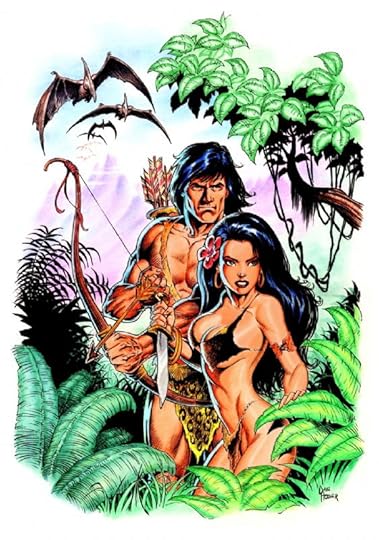
 I agree with both of you. Will laid out some key differences. Here are what I view as some equally strong similarities:
I agree with both of you. Will laid out some key differences. Here are what I view as some equally strong similarities:>Hero arrives in a new world people by barbaric tribes, war-like nations, and strange creatures . . . occurs in both novels
>Hero immediately falls in love with the most beautiful girl in the world (Dian of Sari, and Dejah of Helium) . . . occurs in both novels
>Real quick, both girls' names being with a 'D' . . . occurs in both novels
::Chris stares at Will::
>Immediately, both heroes manage to offend the girl they have instantly fallen for without knowing why . . . occurs in both novels
"Immediately after we resumed the march, and though I realized that in some way I had offended Dian the Beautiful I could not prevail upon her to talk with me that I might learn wherein I had erred"
"Dejah Thoris, I do not know how I have angered you. It was furtherest from my desire to hurt or offend you, whom I had hoped to protect and comfort."
>Both initial novels (and some concurrent ones in both series) involve telepathy. In At the Earth's Core, this telepathy takes place between the Mahars and the Sagoths. In A Princess of Mars, the telepathy takes place people-to-people and people-to-beast (the green and red men of Mars use telepathy to control their steed-like thoats) . . . occurs in both novels
>Both novels involve inventors and geniuses (the science of the Barsoomians, the inventive genius of Abner Perry in At the Earth's Core (remember, Abner invented the "iron mole")
There may be others, but I'm presently tapped out! Here's the Abner Perry I keep in my mind's eye (I love Peter Cushing)
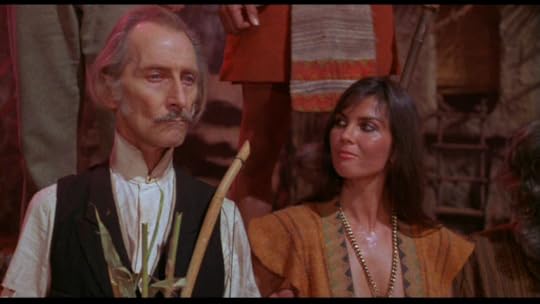
 William wrote: "With REH, pure action and a little societal comparison (the indigenous races probably would have provided all the heroes!)... HPL, by contrast, going underground was just another way to go further back in time"
William wrote: "With REH, pure action and a little societal comparison (the indigenous races probably would have provided all the heroes!)... HPL, by contrast, going underground was just another way to go further back in time"Hah! You make a great point. If this were a homework assignment, we have Two-Gun Howard, Howie Phillips, and Lil' Clark Ashton in class, give them all the task of writing a hollow Earth yarn, we would most likely get:
Two-gun: a Sagoth named U-gan leads his tribe against the white invaders, wipes out their "wizard", then goes on to crush the skull of his tribe's chief, taking his place . . . and his rival's woman.
Howie Phillips: the white expedition begins hearing strange sounds from the forest; one has a creepy book he reads from that summons a being from the outer dark while his more timid friend slinks back to the "mole" upon seeing his friend devoured by the summoned entity and his bones fought over by raptors.
Lil' Clark Ashton: the intrepid earth penetrators find themselves in a sprawling, un-benighted land of mystery where they encounter beings of passing strangeness. One falls in love with the chieftess of an Amazonian-esque tribe where he becomes the male concubine of his gorgeous, primeval beauty.
 Gilbert wrote: "It's really nice to think of them reading each other's works and placing tributes in their own writing ..."
Gilbert wrote: "It's really nice to think of them reading each other's works and placing tributes in their own writing ..."In some cases it is definitely homage, as with "the big three" of Weird Tales (Lovecraft, Smith, Howard) who constantly played in each others' sandboxes. In this case, I believe HPL became fascinated with the sagoth, probably spun it around in his mind for a while, and came up with a creature with a few of the attributes that he liked most about ERB's creation. I'm not sure we'll ever know.
Here's a sagoth from the 1976 movie featuring Doug McClure, Peter Cushing and Caroline Munro. They looked more like a Star Trek species than a sub-human sagoth to me.
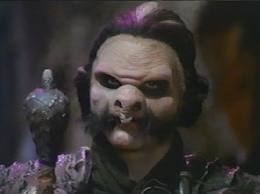
 Gilbert M. Stack
Gilbert M. Stack Gil, you mentioned the influence of At the Earth's Core.
Indeed it was influential, as were many others of ERB's works.
It seemed to me that I recalled reading somewhere that H. P. Lovecraft was influenced by ERB's Sagoths from At the Earth's Core (and other Pellucidar novels, including Tarzan at the Earth's Core, a personal favorite), the hairy submen who were the fetchers of slaves, the warriors and the builders of their Mahar rulers with whom they communicated via the telepathy of the intelligent reptile race with whom they carried on a symbiotic relationship.
It took some digging to find, and this may not be the exact site where I once read this, but on the Lovecraft Wiki site we find this description from Lovecraft's At the Mountains of Madness (note: even the title of the story resembles ERB's title, At the Earth's Core from which it is believed it draws this other reference:
They built their cities with the help of "shoggoths", organisms created to perform any task, assume any form, and reflect any thought.
It's interesting to note that Lovecraft created a creature with such a similar name as ERB's submen which, like the sagoth, renders services to and communicates with, their masters via thought, just as do the sagoths of At the Earth's Core.
In looks, however, Lovecraft's creature is nothing like a sagoth...
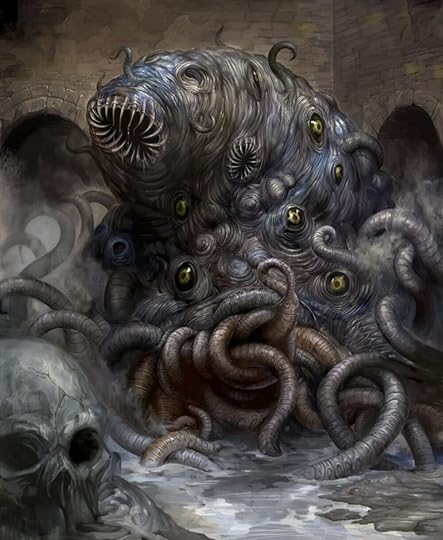
And the sagoth:
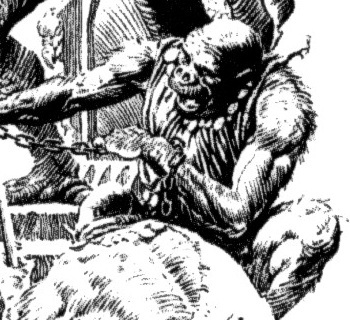
 William wrote: "Can't wait! Fabulous, fun adventure story, and also revealing the cultural heritage of the period. White Man's Burden, anyone?!?"
William wrote: "Can't wait! Fabulous, fun adventure story, and also revealing the cultural heritage of the period. White Man's Burden, anyone?!?"Ironically, ERB wrote a poem titled Black Man's Burden, inspired by Kipling's White Man's Burden.
The Black Man’s Burden
Take up the white man’s burden,
The yoke ye sought to spurn;
And spurn your father’s customs;
Your father’s temples burn.
O learn to love and honor
The white God’s favored sons.
Forget the white-haired fathers
Fast lashed to mouths of guns
Take up the white man’s burden,
Your own was not enough;
He’ll burden you with taxes;
But though the road be rough,
“To him who waits,” remember,
“All things in time shall come;”
The white man’s culture brings you
The white man’s God, and rum.
Take up the white man’s burden;
‘Tis called “protectorate,”
And lift your voice in thanks to
The God ye well might hate.
Forget your exiled brothers;
Forget your boundless lands;
In acres that they gave for
The blood upon their hands.
Take up the white man’s burden;
Poor simple folk and free;
Abandon nature’s freedom,
Embrace his “Liberty;”
The goddess of the white man
Who makes you free in name;
But in her heart your color
Will brand you “slave” the same.
Take up the white man’s burden;
‘And learn by what you’ve lost
That white men called as counsel
Means black men pays the cost.
Your right to fertile acres
Their priests will teach you well
Have gained your fathers only
A desert claim in hell.
Take up the white man’s burden;
Take it because you must;
Burden of making money;
Burden of greed and lust;
Burden of points strategic,
Burden of harbors deep,
Burden of greatest burdens;
Burden, these burdens to keep
Take up the white man’s burden;
His papers take, and read;
‘Tis all for your salvation;
The white man knows not greed.
For you he’s spending millions —
To him, more than his God —
To make you learned, and happy,
Enlightened, cultured, broad.
Take up the white man’s burden
While he makes laws for you,
That show your fathers taught you
The things you should not do.
Cast off your foolish feathers,
Your necklace, beads, and paint;
Buy raiment for your mother,
Lest fairer sisters faint.
Take up the white man’s burden;
Go learn to wear his clothes;
You may look like the devil;
But nobody cares who knows.
Peruse a work of Darwin —
Thank gods that you’re alive —
And learn the reason clearly: —
The fittest alone survive.
— Edgar Rice Burroughs
 Chris wrote: ""There was thunder in the air on the night I went to the deserted mansion atop Tempest Mountain to find the lurking fear."
Chris wrote: ""There was thunder in the air on the night I went to the deserted mansion atop Tempest Mountain to find the lurking fear."-H. P. Lovecraft, The Lurking Fear, 1922"
Hmm, this was interesting, from four years ago. I never knew there was a movie based on The Lurking Fear.
http://theunspeakableoath.com/home/20...
 "There was thunder in the air on the night I went to the deserted mansion atop Tempest Mountain to find the lurking fear."
"There was thunder in the air on the night I went to the deserted mansion atop Tempest Mountain to find the lurking fear."-H. P. Lovecraft, The Lurking Fear, 1922
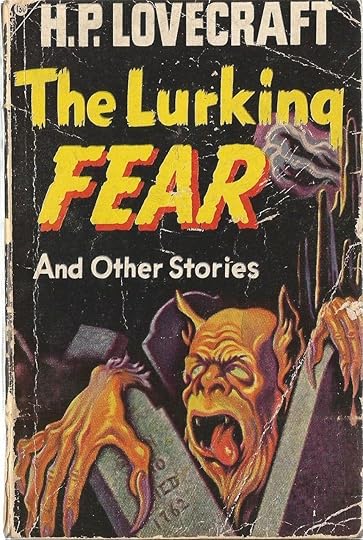
 Ack is right. The transversing of shadows and the way to Amber was just utterly bizarre--especially so because poor Corwin had to act like it was normal when he could recall nothing of how his brother was doing what he was doing (Ie modifying the landscape en route as they were traveling along).
Ack is right. The transversing of shadows and the way to Amber was just utterly bizarre--especially so because poor Corwin had to act like it was normal when he could recall nothing of how his brother was doing what he was doing (Ie modifying the landscape en route as they were traveling along). Kudos to Zelazny for coming up with these fantastic concepts.
 Well, if it was Poker, and Strip Poker at that, I'd rather see Flora or Moire on the losing side than Corwin or Erik!
Well, if it was Poker, and Strip Poker at that, I'd rather see Flora or Moire on the losing side than Corwin or Erik!Just sayin'.

